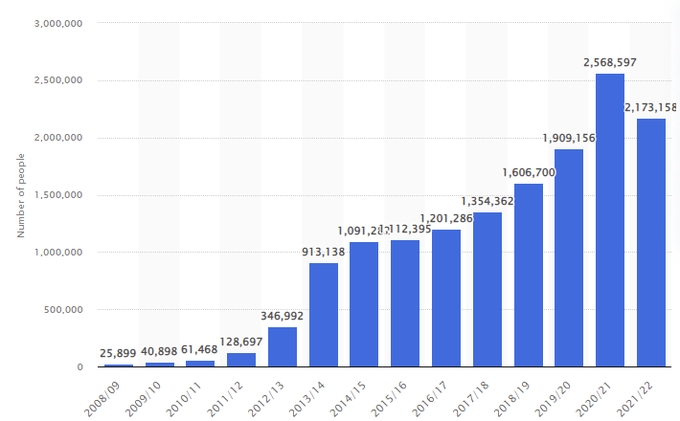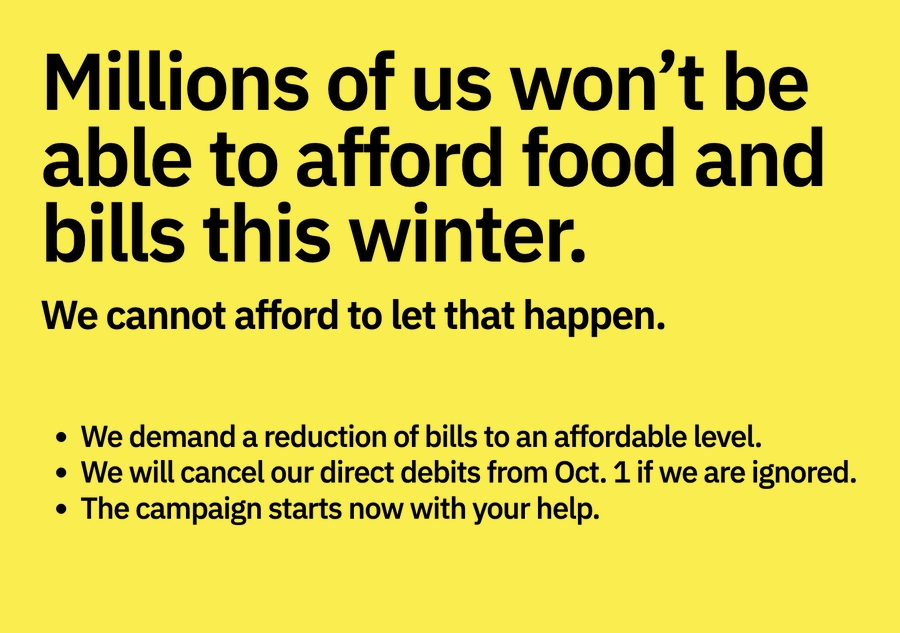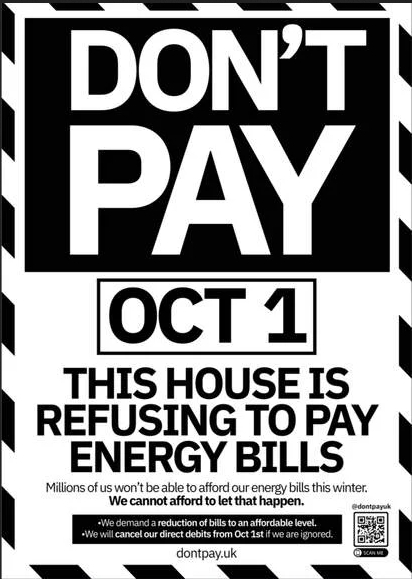Ofgem have today announced the latest so-called ‘energy price cap’, in effect confirming that UK energy bills will rise by 80% this October 1st, meaning they will have tripled in the past 18 months.
Almost every household in the UK will already be aware of such impacts of the present “broken market” for energy, which in practice allows for no meaningful competition or choice (the words of Martin Lewis, the most trusted man in Britain).
But it is about to get so much worse…
Meanwhile, as bills soar, energy company profits are breaking all records. According to no less an authority than the head of the United Nations, the combined profits of the largest energy companies in just the first three months of 2022 were close to a hundred billion dollars ($100,000,000,000).
To put such a number into context, that could give over $3,500 to every household in the UK. Yes, those very same households that are often living in miserable poverty to try to scrape together the money to pay the energy companies.
And with two-thirds of UK households set to be pushed into fuel poverty this winter, leaving countless people choosing between malnutrition and hypothermia as the cold weather arrives, refusal to pay becomes an act of solidarity even for those who could.
Accordingly, back in March a group of us discussed the possibility of an energy bill strike, and — while I haven’t been at all involved with the organisers — I’m delighted to see that Don’t Pay UK are making that a reality.
As such, with the headlines predictably full of the latest confirmed rise in energy prices, Don’t Pay UK are holding a UK-wide Day of Action today, and throughout the weekend, to spread the word about this movement of collective action.
So talk to your friends, share the info online, and join the 115,000+ of us who have already committed to cancel our direct debits on October 1st if a million others agree to do so.
There is no way the government can allow energy companies to cut off (or jail!) a million households, so they’ll have no choice but to join the conversation about re-establishing a balance between corporate profits and people’s lives.
Let’s be clear about where we are. We live in a society in which mothers are being hospitalised with malnutrition through trying to keep their children fed, and where food bank use has increased 100-fold since the 2008 financial crisis, with the below graph from the Trussell Trust revealing they now cater to 1 in 30 of the UK population.

Already we’re seeing hungry people refusing potatoes at those very food banks because they can’t afford to cook them, while the NHS have declared the UK energy situation “a humanitarian crisis”.
In the short term, then, this act of solidarity and collective bargaining is simply necessary to preserve basic human dignity.
And with the average energy bill set to top £5,000, a million cancelled direct debits could see £5 billion removed from those energy company profits. It may still only be a small percentage of the unimaginably enormous profits the energy company shareholders are siphoning off from our society, but you’d better believe it will get their attention.
![]()
With all of that said though, of course good people don’t want to be reduced to relying on food banks and refusing to pay bills.
Nor can food banks meet such rocketing demand and stave off outright starvation forever, since they’re supplied by donations from the ever-fewer who have surplus to share. They aren’t funded by our millionaire politicians or those record energy company profits. Some food banks are already overwhelmed. And it’s still the summer.
Set all of this within the context of plummeting wages, soaring inflation and a collapsing healthcare system — not to mention the wider ecological crisis that will bring ever more droughts, floods, crop failures, mass population dislocations, natural disasters and indeed wars — and surely we can admit that our politicians’ approach is horrifically misguided.
And that maybe, just maybe, it’s time to look again at more humane policy that could actually move us towards a better future? Policy, indeed, that the government deemed “ahead of its time” fourteen years ago, back when it could have averted so much that we face today…
TEQs was at that time the subject of an extensive government feasibility study which confirmed that this simple, equitable solution is viable and ready-to-go.
And unlike carbon-pricing approaches to the climate emergency (which raise energy prices to discourage carbon-intensive consumption) it would immediately benefit those in fuel poverty, having been designed from the outset to ensure fair access to energy for all while also guaranteeing that a nation actually meets its emissions reductions targets.
You can find all details on the TEQs website, but in short it would represent the kind of fundamental reorientation of the energy market towards fairness of supply — rather than shareholder profits — that the present injustices so transparently call for. Like Universal Basic Services (a far more appropriate intervention than Universal Basic Income), it is the kind of radical intervention we desperately need.
Frankly, though, I think we all know that our present government of fatcats will have to witness far greater suffering and civil unrest before they would ever reconsider anything so compassionate. Doubtless that will come.
In the meantime The Fleming Policy Centre and I are giving our full support to Don’t Pay UK. Spread the word.
And don’t miss the below video from the ever-brilliant Honest Government Ads, who manage to both capture and add some gallows humour to the bleak realities of the UK today..!
June ’23 update — Don’t Pay UK have put out an excellent update on what the campaign achieved, what it didn’t, and what might be next:
“We need to be critical, realistic and honest: we won’t pretend to be something we’re not.”






0 Comments